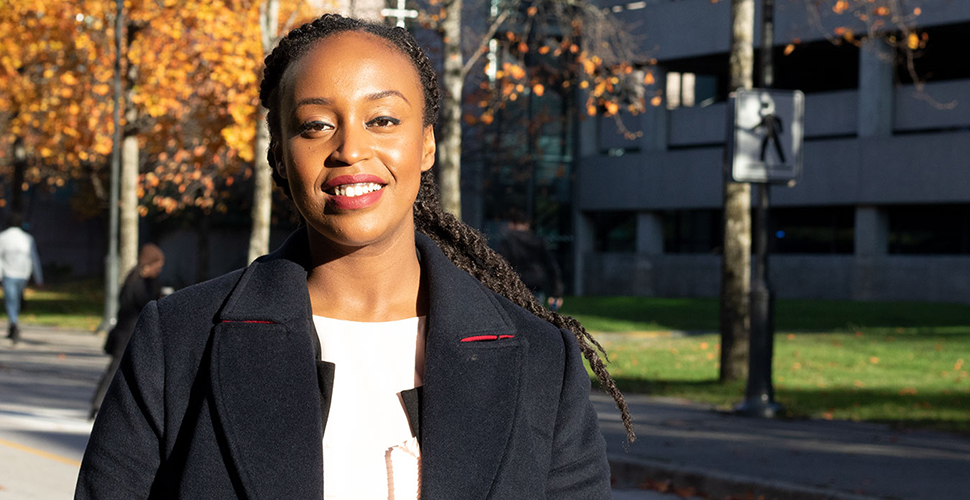Fall Graduation 2019
In 2013, cancer immunotherapy was being heralded as a breakthrough in the scientific community.
This exciting development led Samantha Burugu, a recent graduate from the department of pathology and laboratory medicine, to follow her dreams of advancing cancer research.
Here she describes her PhD thesis on biomarkers in breast tumors, and shares how she is using her training to inform work with biopharmaceuticals.

Samantha Burugu is a graduate of the department of pathology and laboratory medicine.
How did you become interested in studying pathology and laboratory medicine?
While I was finishing up my master’s degree in immunology doing foundational research, I wanted to do research that involved clinical tests conducted in hospitals. Clinical tests can be used for disease diagnoses and/or for treatment decisions. After interviewing with my doctoral thesis advisor, Dr. Torsten Nielsen, the pathology and laboratory medicine program was a clear choice. It aligned with my thesis research in biomarker development and my career aspirations.
How did you choose your area of focus in your program?
We hear every day about increasing global incidence of cancers and that everyone in their lifetime has had, or will have, someone within their immediate circle affected by cancer. I wanted to get involved in advancing cancer research. In addition, I had trained in immunology and at the start of my program Science Magazine had just named cancer immunotherapy the 2013 Breakthrough of the Year. Cancer immunotherapy works by unleashing a patient’s own immune system to fight cancer and this strategy led to incredible results in some cancer patients receiving immunotherapy drugs in clinical trials.
Fall Graduation 2019
This fall, students graduate from a range of Faculty of Medicine programs.
What was the focus of your thesis?
Although cancer immunotherapy has led to remarkable clinical results in otherwise incurable cancers, the majority of cancers do not respond to these treatments and we still have not fully elucidated the mechanisms. My doctoral thesis focused on identifying potential biomarkers in breast tumors excised from patients that would indicate a predictive ability to respond to novel cancer immunotherapy drugs.
What did you find?
Using conventional and novel techniques to analyze breast tumors excised from patients, I found the presence of immune cells that can be reactivated by novel immunotherapy drugs to eliminate cancer cells. This work can inform the prioritization and design of immunotherapy clinical trials for breast cancer patients.
What advice would you give to students considering studying pathology and laboratory medicine?
My advice is to not be afraid to get involved in the department and try to get the most of graduate studies. By participating in different departmental committees, graduate student associations and attending professional advancement learning series (just to name a few), not only will you build a professional network but also you will develop transferable skillsets.
What does a healthy community look like to you?
A healthy community for me is where you feel a sense of belonging. In that sense, you feel respected, engaged, and encouraged by the community. Everyone in a healthy community participates in their own way to make the community better.
What’s next for you?
I have recently started working at Grifols, a plasma-derived biopharmaceutical company, as a Scientific Development Manager. As part of the Medical Affairs team, I provide medical and scientific understanding of our plasma-derived therapeutic products to health care professionals and researchers.
